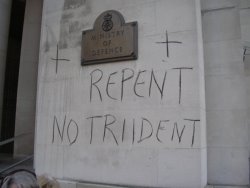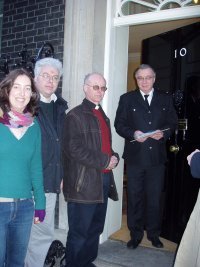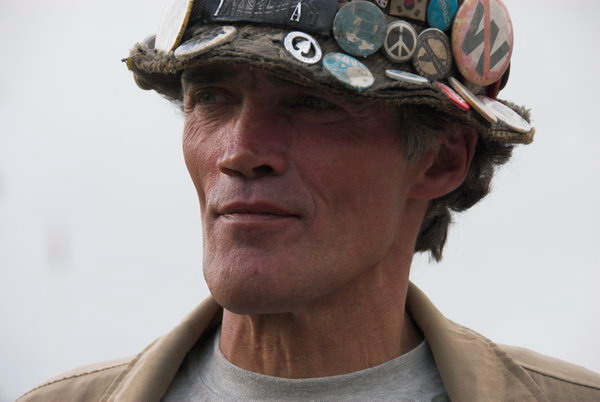On BAe spies and corruption by Virginia
George Monbiot recently wrote an article in the Guardian about British Aerospace (BAe) and how it seems to always be above the law. In it he mentioned the story of how the company used spies to infiltrate the campaign organisation, Campaign Against the Arms Trade (CAAT). This story had a big impact on our lives three years ago when it was first revealed and here’s why.
When Chris and I got together back in 1995, BAe was much on our minds. Chris had just served 3 months out of a 6 month prison sentence for breaching the injunction BAe had laid on him for his work against their arms dealing. I had decided it was time that I did more than support CAAT by getting their newsletter, and was beginning to get involved in the anti-Hawks to Indonesia campaign. One of our little jokes was that BAe was watching our every move, another that I was a BAe mole going deep undercover. You can imagine our surprise when we discovered 8 years later that our joke was actually true, BAe had employed a company run by a woman called Evelyn le Chene, who had a whole raft of spies placed throughout CAAT and the anti-arms trade movement. They attended anti-arms trade events, worked as volunteers in the office, and in local groups. Two were particularly good at maintaining a long involvement, one becoming a core member of Hull Against the Hawks before moving to Liverpool to engage with activists there, the other started off as a volunteer in CAAT and eventually became a member of staff there, and one of Chris’ colleagues.
The story had a big effect on us. It was a shock to discover that Le Chene’s spies had thought it necessary to report on our wedding and where we lived, providing us with an immediate paranoia that somehow someone we knew well had passed this information on. A further shock was when CAAT discovered that their member of staff was passing information from everyone’s work files to an unnamed email address. Chris had just left CAAT at this point, but to realise that someone he had worked with every day for 3 years had done this was deeply unsettling. It was also horrible to think that the spies had made friends with people in the movement, used these friendships to further their ends, and carried on with this work, even when they could see for themselves the suffering caused by the arms trade. A final realisation was that both the long term spies had made a point over the last few years of seeking me out at vigils, playing with the children and chatting to me. In hindsight, the only reason they would have done that was to attempt to build trust between us, and I found it extremely unpleasant that people would choose to do this through me and our children. So in the immediate aftermath of us finding out about the spying, we found ourselves being much more suspicious than usual of people we didn’t know, and I even found myself looking over my shoulder and being careful what I said on the phone.
But as we gathered more information about the extent of the spying and what Le Chene had passed on, some of this receded. The report about our wedding appeared to have come from a mention in the CAAT newsletter; they caught up with our address a good eighteen months after we were there. A lot of the information they did get was tittle tattle or misinterpretation of people’s motives and events. And in a way I found this quite amusing. Le Chene comes from a world of hierarchical authority, where people only act in accordance with what they can get out of things. As a result, she and her employees really didn’t get what we were about. They were constantly looking for a boss, or authority figure who was telling people what to do, completely misunderstanding how we often we work consensually, with different people taking roles at different times. They also couldn’t understand often why people were doing a particular action, or what our motivations were. So if arguments happened between people (as often happens in peace work), they were continually ascribing the worst motivations to the players, rather than understanding people had different positions on things that sometimes took time to resolve.
And the most encouraging thing I found in the end was that, despite all their spies and reports, they never got near to knowing that the Seeds of Hope Ploughshares action was even in the offing, let alone stopping it happening. Since it is only the odd action like this that needs to be secret, it confirmed for us that we should just carry on in our usual open fashion. And if we ever do want to plan something serious, we would just do it with very close and trusted friends.
Chris and I are not naïve; we and others did think that BAe sent people to events to monitor what was being said. We were just taken aback by the very scale of this. What we did realise on reflection was how often our instincts were true. In 1996 we were at an event and in a debrief at the pub afterwards we played “Spot the BAe spy”. Everyone swore blind it was a person in their group. We discovered later that we were all right – Le Chene had every group covered. Chris once came back from a demo and when I asked him how it went he said it was 4 of them and a BAe spy. This was the individual who later came to work at CAAT and who managed to allay Chris’ initial suspicions by the way he went to great lengths to involve his family in CAAT’s work. So three years on, we are no less trusting but a little bit more discerning about listening to those instincts better.
And of course we need to keep following our instincts, because as George Monbiot points out BAe are at it again. CAAT has recently applied for a judicial review of the appalling decision of the Serious Fraud Office to drop an anti-corruption inquiry into BAe’s arms deals with the Saudis. Not only does BAe sell weapons to some of the nastiest regimes but it does so through the use of bribes and commissions. The government has sought to hold a moral high ground on stamping out corruption in the international business community, and yet somehow the SFO were persuaded to drop the enquiry on the grounds that it affected “national intelligence”.(Something our intelligence agencies have since denied). No wonder CAAT went to the lawyers. In doing so they discovered that a private email from them to their legal team has made its way to BAe. Yet again someone somewhere is still keeping tabs on CAAT. Shocking? Not really, not any more. Disheartening? I’m sure it must be to our friends in CAAT. But will it stop them or any of us calling BAe to account? Not one bit. BAe is the biggest global arms dealer in this country, usually in the top 3 arms dealers in the world. That it needs to waste its energy and resources spying on a tiny organisation with a turnover that probably wouldn’t keep it in paper clips for a year, just goes to show how effective CAAT is.
I’m delighted to say that this week CAAT has been granted an injunction against BAe who have been ordered to reveal the source of the email. Hopefully, this will identify the current mole, though doubtless others will be recruited to take that person’s place. And hopefully it will mean that CAAT can at least get on with its legal work in private so it is able to make the best case it can.
So keep up the good work CAAT and lets hope this judgement is a good omen for success in the judicial review.
When Chris and I got together back in 1995, BAe was much on our minds. Chris had just served 3 months out of a 6 month prison sentence for breaching the injunction BAe had laid on him for his work against their arms dealing. I had decided it was time that I did more than support CAAT by getting their newsletter, and was beginning to get involved in the anti-Hawks to Indonesia campaign. One of our little jokes was that BAe was watching our every move, another that I was a BAe mole going deep undercover. You can imagine our surprise when we discovered 8 years later that our joke was actually true, BAe had employed a company run by a woman called Evelyn le Chene, who had a whole raft of spies placed throughout CAAT and the anti-arms trade movement. They attended anti-arms trade events, worked as volunteers in the office, and in local groups. Two were particularly good at maintaining a long involvement, one becoming a core member of Hull Against the Hawks before moving to Liverpool to engage with activists there, the other started off as a volunteer in CAAT and eventually became a member of staff there, and one of Chris’ colleagues.
The story had a big effect on us. It was a shock to discover that Le Chene’s spies had thought it necessary to report on our wedding and where we lived, providing us with an immediate paranoia that somehow someone we knew well had passed this information on. A further shock was when CAAT discovered that their member of staff was passing information from everyone’s work files to an unnamed email address. Chris had just left CAAT at this point, but to realise that someone he had worked with every day for 3 years had done this was deeply unsettling. It was also horrible to think that the spies had made friends with people in the movement, used these friendships to further their ends, and carried on with this work, even when they could see for themselves the suffering caused by the arms trade. A final realisation was that both the long term spies had made a point over the last few years of seeking me out at vigils, playing with the children and chatting to me. In hindsight, the only reason they would have done that was to attempt to build trust between us, and I found it extremely unpleasant that people would choose to do this through me and our children. So in the immediate aftermath of us finding out about the spying, we found ourselves being much more suspicious than usual of people we didn’t know, and I even found myself looking over my shoulder and being careful what I said on the phone.
But as we gathered more information about the extent of the spying and what Le Chene had passed on, some of this receded. The report about our wedding appeared to have come from a mention in the CAAT newsletter; they caught up with our address a good eighteen months after we were there. A lot of the information they did get was tittle tattle or misinterpretation of people’s motives and events. And in a way I found this quite amusing. Le Chene comes from a world of hierarchical authority, where people only act in accordance with what they can get out of things. As a result, she and her employees really didn’t get what we were about. They were constantly looking for a boss, or authority figure who was telling people what to do, completely misunderstanding how we often we work consensually, with different people taking roles at different times. They also couldn’t understand often why people were doing a particular action, or what our motivations were. So if arguments happened between people (as often happens in peace work), they were continually ascribing the worst motivations to the players, rather than understanding people had different positions on things that sometimes took time to resolve.
And the most encouraging thing I found in the end was that, despite all their spies and reports, they never got near to knowing that the Seeds of Hope Ploughshares action was even in the offing, let alone stopping it happening. Since it is only the odd action like this that needs to be secret, it confirmed for us that we should just carry on in our usual open fashion. And if we ever do want to plan something serious, we would just do it with very close and trusted friends.
Chris and I are not naïve; we and others did think that BAe sent people to events to monitor what was being said. We were just taken aback by the very scale of this. What we did realise on reflection was how often our instincts were true. In 1996 we were at an event and in a debrief at the pub afterwards we played “Spot the BAe spy”. Everyone swore blind it was a person in their group. We discovered later that we were all right – Le Chene had every group covered. Chris once came back from a demo and when I asked him how it went he said it was 4 of them and a BAe spy. This was the individual who later came to work at CAAT and who managed to allay Chris’ initial suspicions by the way he went to great lengths to involve his family in CAAT’s work. So three years on, we are no less trusting but a little bit more discerning about listening to those instincts better.
And of course we need to keep following our instincts, because as George Monbiot points out BAe are at it again. CAAT has recently applied for a judicial review of the appalling decision of the Serious Fraud Office to drop an anti-corruption inquiry into BAe’s arms deals with the Saudis. Not only does BAe sell weapons to some of the nastiest regimes but it does so through the use of bribes and commissions. The government has sought to hold a moral high ground on stamping out corruption in the international business community, and yet somehow the SFO were persuaded to drop the enquiry on the grounds that it affected “national intelligence”.(Something our intelligence agencies have since denied). No wonder CAAT went to the lawyers. In doing so they discovered that a private email from them to their legal team has made its way to BAe. Yet again someone somewhere is still keeping tabs on CAAT. Shocking? Not really, not any more. Disheartening? I’m sure it must be to our friends in CAAT. But will it stop them or any of us calling BAe to account? Not one bit. BAe is the biggest global arms dealer in this country, usually in the top 3 arms dealers in the world. That it needs to waste its energy and resources spying on a tiny organisation with a turnover that probably wouldn’t keep it in paper clips for a year, just goes to show how effective CAAT is.
I’m delighted to say that this week CAAT has been granted an injunction against BAe who have been ordered to reveal the source of the email. Hopefully, this will identify the current mole, though doubtless others will be recruited to take that person’s place. And hopefully it will mean that CAAT can at least get on with its legal work in private so it is able to make the best case it can.
So keep up the good work CAAT and lets hope this judgement is a good omen for success in the judicial review.




